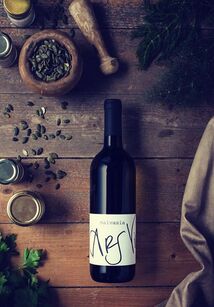
In this second chapter we'll introduce you to the second dish especially created for one of Do Ville's “Ars Vivendi” wines.
Kevin Li's extraordinary skills for an extraordinary Malvasia
Some very peculiar Chinese ingredients contribute to a seeming simple dish, which hides instead a masterfully skilled training. Kevin Li is known for his commitment to culinary art and to innovating tradition with his creative ideas. His recipe for Do Ville's "Ars Vivendi" Malvasia is wok fried river shrimps and tallow tree seeds (click here for full ingredients and method).
The flavours all rest in two main ingredients, one a very typical addition to Asian dishes, while the other being a quite unusual choice. Maggi sauce is actually a largely, commonly used seasoning in almost any Asian country. It's a liquid, dark-coloured hydrolyzed vegetable protein-based sauce, looking like soy or Worcester sauce, invented in Switzerland as late as the 19th century and it's very popular as an enhancer for broths and soups. It certainly has some herbs in it, though its formula is still a well-kept secret: there are at least nine variations sold around the world, according to different regions' tastes (the Mexican one is more chili-oriented, for example). Let's say it can be easily found in every Chinese kitchen.
But Chinese tallow tree seed oil really is a rare ingredient, instead. Tallow tree is an ornamental tree native to eastern China and Taiwan, more known for its many industrial uses (the wax which coats its seeds is employed for soaps and candles). The seeds contain two different kinds of fats and the oil is seldom used for cooking purposes. There lies Li's touch of genius!
Beauty and plainness: the Huaiyang cuisine
Chef Li is specialized in Cantonese cuisine (the most widely experienced Chinese cuisine in Italy) and in Huaiyang cuisine. The latter has the ingredients' freshness as its flagship, preferring freshwater fisheries as in the Do Ville's recipe.
Being in the quartet of China's most valued cuisines, it originated in the cities of Huai'an, Yangzhou and Zhenjiang, in the Jiangsu Province (along the rivers Huai and Yangtze, and near the Yellow Sea) and it flaunts ancient roots. Huaiyang cuisine has always been a favourite choice for official banquets since the Ming Dynasty (1368-1644 A.D.) for a few reasons: each dish is based on its main ingredient and on how it is cut, implying that elaborate slicing skills play a key role for its good-looking dishes, that are cooked carefully over a low fire.
Huaiyang style isn't as spicy as other Chinese cuisines, it tends to be sweeter and simpler instead: that's why chef Li's recipe was paired to a Malvasia, a sweet white wine made of a 100% Istrian Malvasia grapes. In Do Ville “Ars Vivendi” the notes of apple, apricot and plum pleasantly blend in with the shrimps’ texture and their sweet sour coating.
Kevin Li (born in Zhuhai City, Guangdong Province) has over 20 years of culinary experience and worked for international top level hotel restaurants: Fairmont Nanjing, Hilton Wanda Nanjing, Shangri-La Suzhou, Wanda Realm Hotel Dandong and many others. He was awarded many prizes throughout his career, including the title of “Master of Chinese Cuisine” at the “National Culinary Skills Competition” (2013).



 RSS Feed
RSS Feed